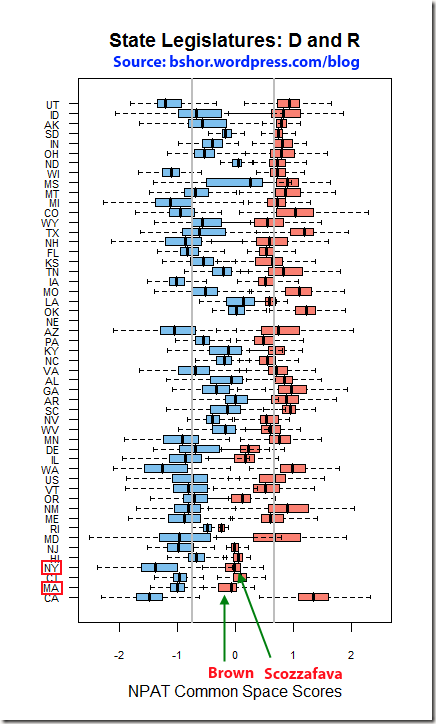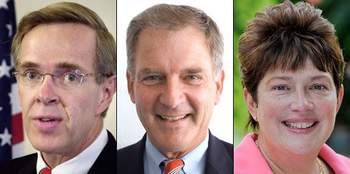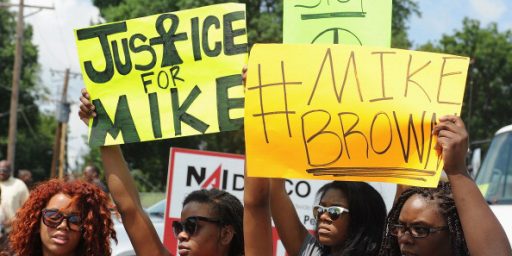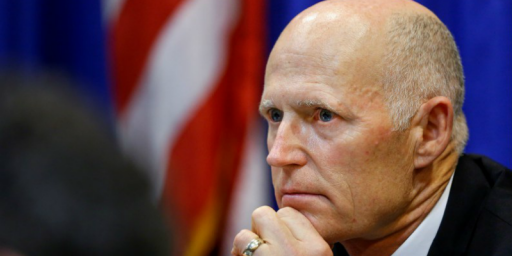Scott Brown’s a Liberal. Why are Conservatives So Enthusiastic?
538‘s Andrew Gelman points me to University of Chicago political scientist Boris Shor‘s analysis of the Massachussets Senate race between Martha Coakley and Scott Brown to fill out the remainder of the late Ted Kennedy’s term. Specifically, he poses an interesting question:
Brown is attracting very positive national and state Republican and conservative attention. On the other hand, State Assemblywoman Dede Scozzafava attracted very negative attention from conservatives in her special election campaign for the 23rd Congressional District of New York.
Brown is actually a liberal Republican who is to be found to the left of Dede Scozzafava! So why, then, the enthusiasm gap in support for the two?
He continues:
Citing my ongoing research on ideology in state legislatures in an earlier blog post, I made some waves by arguing that Scozzafava was actually a conservative Republican in a particular context. That context was the New York State legislature, where Republicans are exceedingly liberal relative to the rest of the country. In fact, she was actually located slightly to the right of the average Republican in the legislature. Despite this, there was a firestorm of opposition to her, leading to an insurgent challenge by Doug Hoffman under the Conservative Party label and her subsequent withdrawal from the campaign.
What about Scott Brown? How liberal or conservative is he? We have evidence from multiple sources. The Boston Globe, in its editorial endorsing Coakley, called Brown “in the mode of the national GOP.” Liberal bloggers have tried to tie him to the Tea Party movement, making him out to be very conservative. Chuck Shumer called him “far-right.”
From here, Shor goes on to commit political science, using an elaborate scale that allows us to see how politicians compare to others within there state and then to compare across state lines.
By doing so, I can estimate Brown’s ideological score very precisely. It turns out that his score is —0.17, compared with her score of 0.02. Liberals have lower scores; conservatives higher ones.
Brown’s score puts him at the 34th percentile of his party in Massachusetts over the 1995-2006 time period. In other words, two thirds of other Massachusetts Republican state legislators were more conservative than he was. This is evidence for my claim that he’s a liberal even in his own party. What’s remarkable about this is the fact that Massachusetts Republicans are the most, or nearly the most, liberal Republicans in the entire country!
Of course, while the Republicans here are liberal, Democrats are incredibly liberal. In comparison to them, Brown is a conservative. He was also the most conservative of the tiny handful of Republican State Senators.
And, thus:
It makes perfect sense that Scott Brown, a liberal Massachusetts Republican, has attracted Republican and conservative support. He’s perfectly suited for his liberal state electorate. Dede Scozzafava, in fact considerably more conservative than Scott Brown was not nearly so well matched to her intended constituency, the relatively conservative 23rd District that had returned moderate conservative John McHugh since the 1992 election.
What this shows, however, is that the conservative base in the United States, far from dragging their party moblike into an unelectable extreme, has made the decentralized decision to support the realistically best candidate they can relative to the context in which he’s being elected. The 23rd special district election can also be seen in this light; throwing Scozzafava overboard made far more sense in the context of that electorate.
Which, incidentally, is exactly what principled conservatives should be doing across the board. Of course, the problem with the NY23 race was that, once conservatives forced Scozzafava from the race, they were left with a candidate who was both too conservative for the district and without the benefit of carrying the Republican Party brand. So, an initially rational choice led to irrational action.







No matter what scale you use, Scuzzy was for health care and converted to the democrat side, endorsing the Democrat. You your comparison with Brown shows the frailty of calling politics science. Using scientific method, what about politics is reproducible, given the same circumstances. Humanities are NOT science, no matter how you label yourselves. Brown is running against Health Care reform and looks like the only thing you could label him with liberal tendencies is his stance on abortion. He is pro choice but anti late term and is pro parental notification. In Mass, I doubt that is considered liberal.
Wrong context. The question should be whether Scozzafava was too liberal for the NY23rd?
I would also say that part of the problem with Scozzafava was how she was chosen to run for the seat.
The process for how Brown ended up running just didn’t have the wrapping of inside party politics anointing-I won’t go so far as to say it didn’t happen in Massachusetts but if it did it wasn’t quite as obvious.
And I also think Brown just seems to know how to campaign and make his case for what he believes. My proximity to Massachusetts may be a factor in this opinion, but in a lot of ways Scozzafava just felt too much like party hackery, and not even good party hackery.
I think most sane conservatives understand that to win in a state like Massachusetts you can’t run somebody who fits neatly into the party in Alabama, not if you want to win.
Not only was it the way in which Scozzafava was chosen, it was the endorsements from ACORN, unions, the Kos, etc. which ignited much of the conservative fervor against her. Remember at or about the time of the NY-23 the ACORN scandal was still fresh in a lot of people’s minds. It is difficult, if not impossible, to quantify a populist reaction to a candidate
Andrew Gelman posted this Shor chart one 538.com and yesterday I tried to puzzle the data out. Let me tell you the most I make of it is that Tip O’Neill was right in his pronouncement that “All politics is localâ€.
Compilation of this data,<a href" http://www.fivethirtyeight.com/2010/01/scott-brown-is-liberal-republican.html this data, was:
Let’s get this straight. The Scozzafava NY 23ed District campaign was the most inept political exercise in the history of mankind. Consider the following:
To compare the NY 32nd to the Mass special election for Senator is madness. The former has no Jumbo Prize, the latter holds passage of the Health Care Plan in its hands.
I can’t see how it matters if he is moderate or conservative repub in his personal views or state senate voting record, because he will go to Washington and toe the obstuctionist party line all the way. From what I recall bipartisan work in the senate this year is very rare: O. Snowe voted with dems to move HCR out of committee, I think L. Graham might appear to be open to working on climate change and McCain appears willing to working with Cantwell on financial reform- none of these are actual bipartisan accomplishments. Otherwise I see obstructionism on every issue and united GOP determination to make sure Obama and the dems accomplish nothing.
Looks like James is reaching again to prove that we need to elect Dem-lites instead of conservative. The NY-23 showed a third party conservative with little time and resources can nearly pull off an upset against the two major party candidates.
I can come up with a study that shows Ted Kennedy was a conservative. Clearly he was not. Also the effort to pick one or two areas that a person may be consider liberal as proof that they are liberal is lame. “If†Brown gets elected, we can watch his votes and see where he falls.
Regardless I fed up with this constant effort to get others to compromise their principles in the name of “let’s just get someone with an R behind their name”.
James is both right and wrong in his comments. Scazzofava was unfairly maligned as a liberal because she was a weak candidate. She allowed liberal groups to attach themselves to her to try and turn her. She had a Martha Coakley view of her run as well. But James is right in that she was only a social liberal, not an economic liberal.
Brown is clearly a social liberal, which in Massachusetts pretty much is a requirement for statewide office. (Ask Mitt Romney) On the other hand he is a great campaigner and only chooses to focus on the areas he is conservative. Even better Dick Armey got alot of heat over his personal handling of New York 23, so he has it in his best interest to make the tea party more about economic conservatism than theocratic issues like abortion and gay marriage. Armey is a smart guy and knows that the tea party movement will collapse if it is not seen as somewhat libertarian, thus the recent conversion to love and respect for Ron Paul.
Scazzofava could have beat Dick Armey by going head to head on Fox which I am sure they were trying to arrange. Brown asked to bridge differences early on which is why he has the support of the conservative coalition. That and the smell of blood in the water.
What it really shows is who conservatives were revolting against. National conservatives didn’t revolt against the idea of having a middle-of-the-road candidate from NY, the revolted against having a such a candidate foisted upon the masses by the party bosses. If Ms Scozzafava had earned her space on the ticket by defeating other candidates in a primary she would have gained the respect of the conservative movement.
Brown beat back challengers in a primary, not in Mr Steele’s interview room.